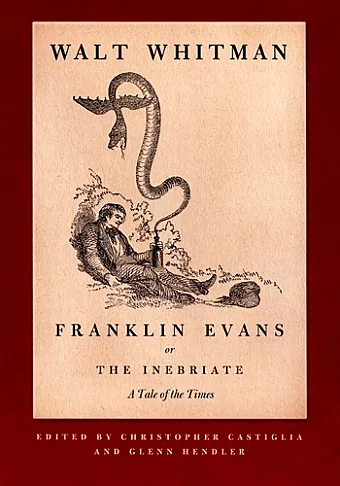Franklin Evans, or The Inebriate
A Tale of the Times
Walt Whitman author Christopher Castiglia editor Glenn Hendler editor
Format:Hardback
Publisher:Duke University Press
Published:17th Jul '07
Currently unavailable, and unfortunately no date known when it will be back

A reprint of a novel and other temperance writings by Walt Whitman, with an introduction and explanatory notes
Tells the rags-to-riches story of Franklin Evans, an innocent young man from the Long Island countryside who seeks his fortune in New York City. Corrupted by music halls, theatres, and above all taverns, he gradually becomes a drunkard.Not many people know that Walt Whitman—arguably the preeminent American poet of the nineteenth century—began his literary career as a novelist. Franklin Evans, or The Inebriate: A Tale of the Times was his first and only novel. Published in 1842, during a period of widespread temperance activity, it became Whitman’s most popular work during his lifetime, selling some twenty thousand copies.
The novel tells the rags-to-riches story of Franklin Evans, an innocent young man from the Long Island countryside who seeks his fortune in New York City. Corrupted by music halls, theaters, and above all taverns, he gradually becomes a drunkard. Until the very end of the tale, Evans’s efforts to abstain fail, and each time he resumes drinking, another series of misadventures ensues. Along the way, Evans encounters a world of mores and conventions rapidly changing in response to the vicissitudes of slavery, investment capital, urban mass culture, and fervent reform. Although Evans finally signs a temperance pledge, his sobriety remains haunted by the often contradictory and unsettling changes in antebellum American culture.
The editors’ substantial introduction situates Franklin Evans in relation to Whitman’s life and career, mid-nineteenth-century American print culture, and many of the developments and institutions the novel depicts, including urbanization, immigration, slavery, the temperance movement, and new understandings of class, race, gender, and sexuality. This edition includes a short temperance story Whitman published at about the same time as he did Franklin Evans, the surviving fragment of what appears to be another unfinished temperance novel by Whitman, and a temperance speech Abraham Lincoln gave the same year that Franklin Evans was published.
“Christopher Castiglia and Glenn Hendler provide a truly state-of-the-art introduction to Walt Whitman’s only novel, a lively and thorough account of the varied contexts that best illuminate the significance of Whitman’s rough and rowdy tale.”—Michael Moon, author of Disseminating Whitman: Revision and Corporeality in Leaves of Grass
“Readers interested primarily in the social history of the country will find much here that is compelling. The temperance movement was the first wide-spread social reform movement in the United States, and the novel’s greatest claim to interest from a wider readership comes from what it reveals about that movement. . . . [T]here are also glimpses of the young poet’s developing voice. The novel reveals a belief in the power of words to change the lives and influence the actions of individual readers, most of whom would have come from the working class. Joined with more original language, this conviction would give Leaves of Grass, written a decade later, its passion and force.” -- Kim Roberts * White Crane Journal *
ISBN: 9780822339311
Dimensions: unknown
Weight: 422g
208 pages